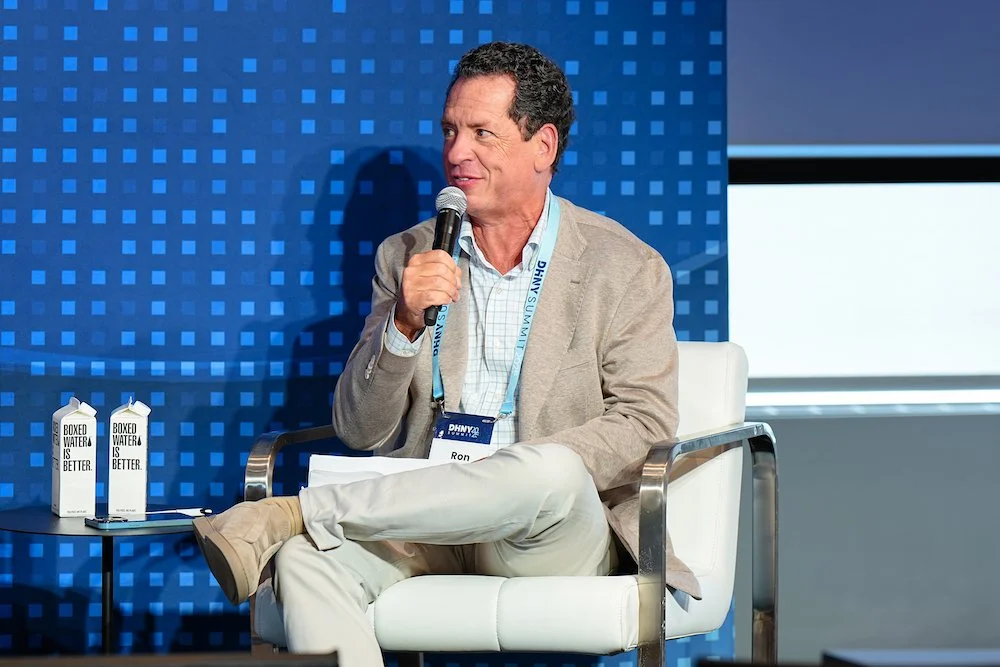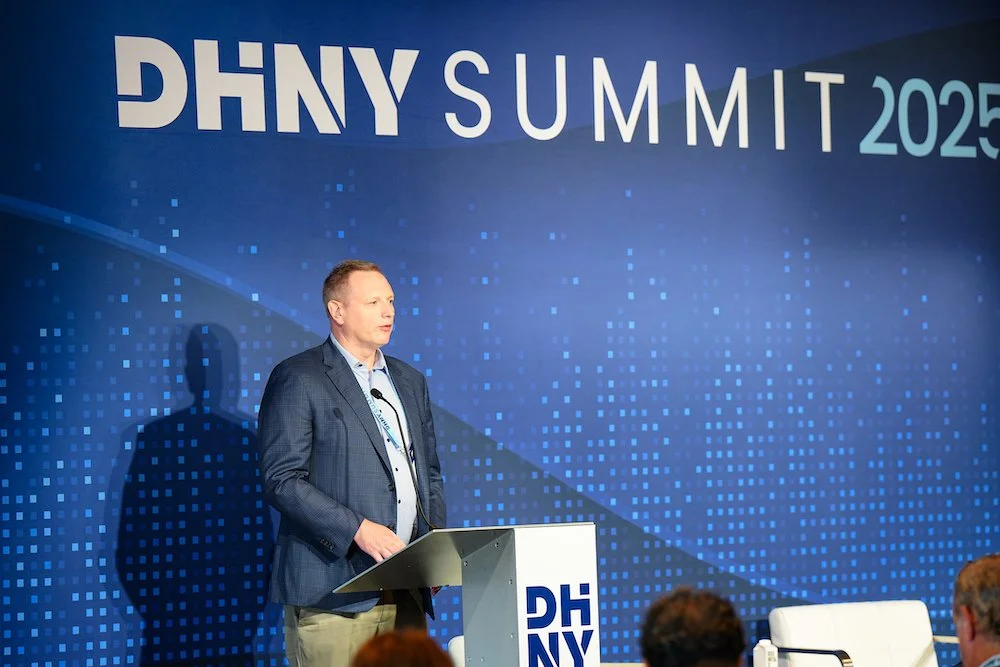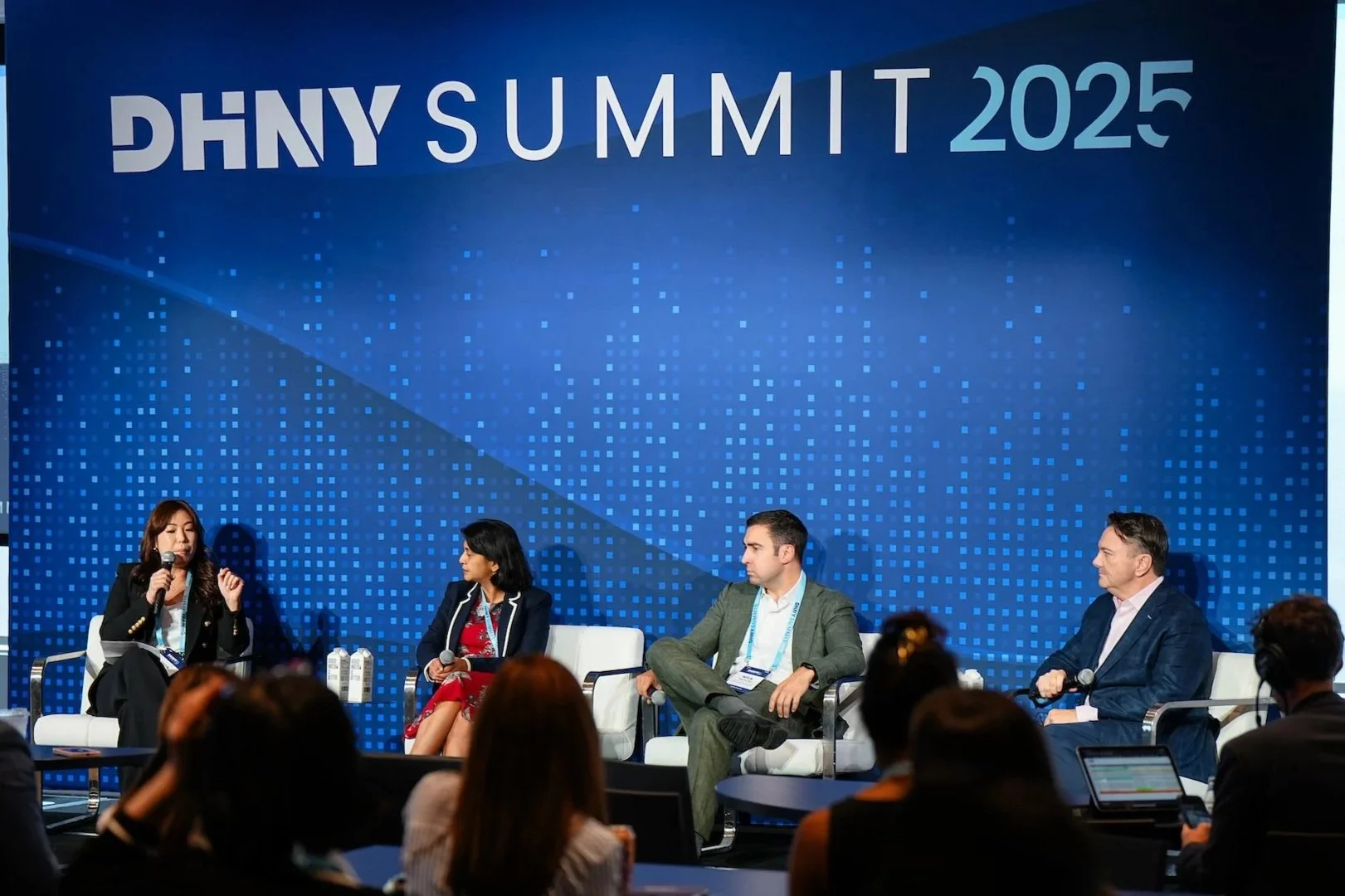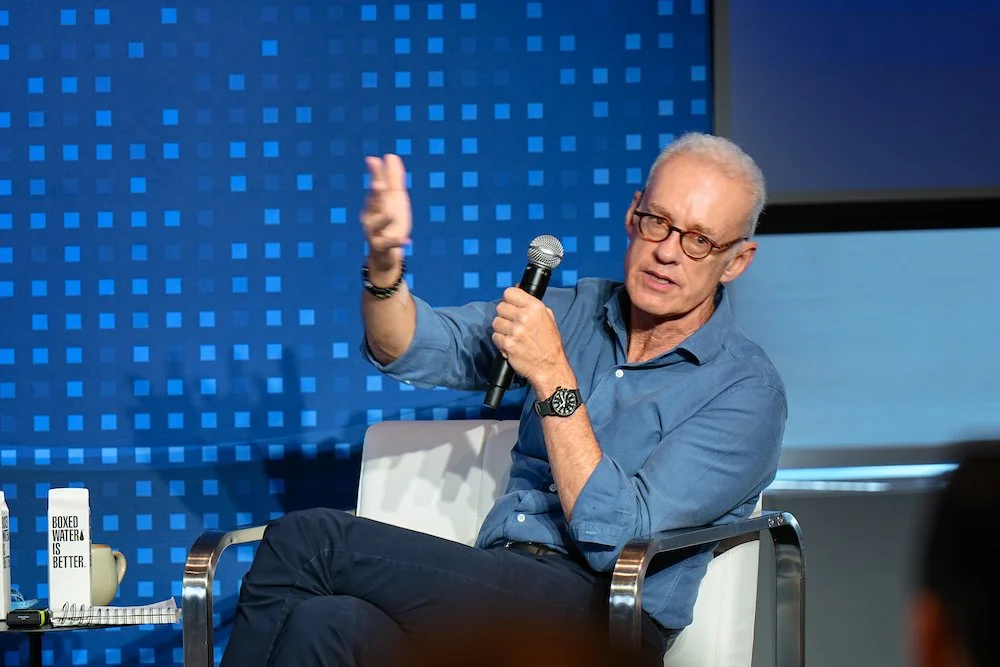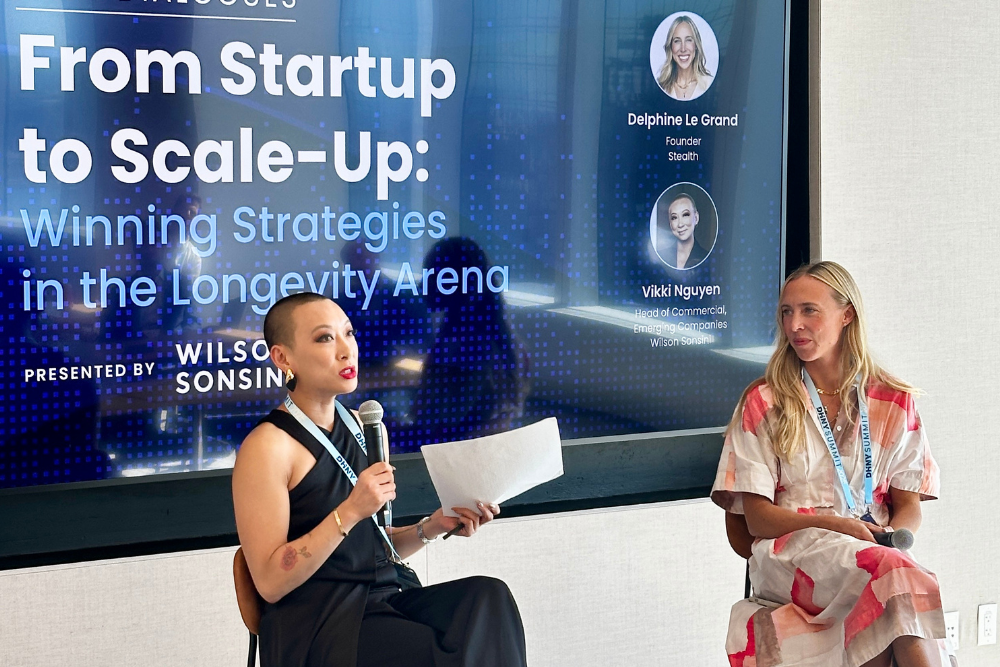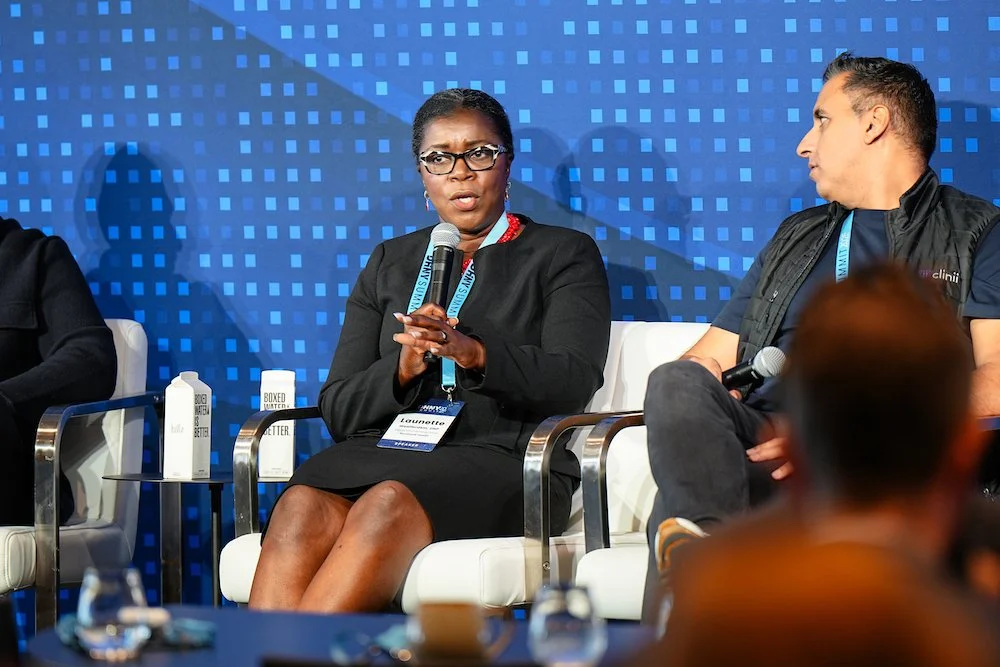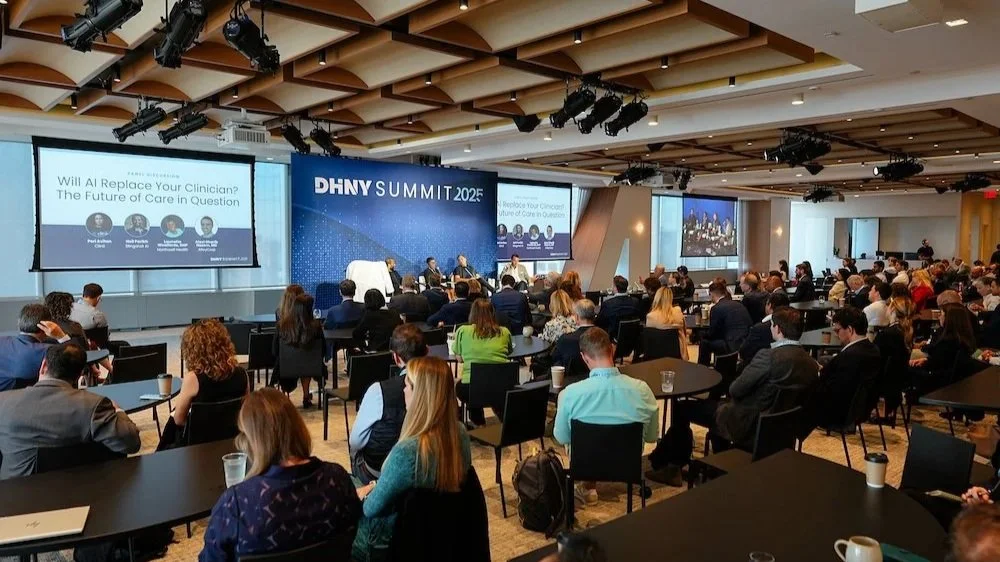
key takeaways
At the fourth annual DHNY Summit on September 18, the industry’s top leaders in healthcare, technology and investing took the stage to discuss the most pressing issues of the day. They covered everything from new challenging federal policies to the growing role of artificial intelligence to the chronic health concerns plaguing patients. They offered their perspectives on the solutions that will drive healthcare forward. All agreed that digital health is at an inflection point. Here are the primary takeaways from the event including insights directly from the experts.
New York is leading the digital health market. And investors have raised the bar for what they’re interested in.
New York has been a rising star in the industry for years, and now there’s data to prove it. According to a study from Carta, NYC led the nation in early-stage health tech funding in 2024.
Ron Fleming, a partner and head of emerging companies at Pillsbury, said there’s no better town than New York to inspire startups to reach new heights. As we’ve always known, the city’s unparalleled mix of talent, diversity of thought and “bones”–countless sites with historical health signficance–make this town indelible.
Nationally, said JP Morgan managing director Chris Lloyd, deal numbers are rebounding after a tough couple of years, recent health tech IPOs have performed well after going public and there’s plenty of dry powder.
About five years ago, investors were throwing huge amounts of money into point solutions, companies that promised to solve one of many acute pain points consumers experience. But the following cooldown has made today’s investors shrewd and exacting.
According to Lloyd, they’re looking for startups that display competitive leadership and positioning, recurring revenue and profitability. The focus is on sustainable growth, differentiation in terms of outcomes and comprehensive solutions that tackle the industry’s most compelling issues.
“Established, best-in-class companies that can grow at scale are having no trouble attracting investors,” Lloyd added.
Ron Fleming, Partner & Head of Emerging Companies, Pillsbury
Chris Lloyd, Managing Director, Healthcare Venture Capital Coverage, J.P. Morgan
Artificial intelligence: Not a replacement, but an essential partner in care.
Experts from leading healthcare organizations like Northwell Health and Memorial Sloan Kettering Cancer Center to AI startup founders from Clinii and SlingShot AI agreed that AI doesn’t yet have the compassion, empathy or irreplaceable human knowledge to make trustworthy clinical decisions.
But with growing patient demand, workforce shortages, and overflowing clinician workloads, health systems must integrate AI to reduce friction and free up providers to do what only people can do—care for people. These applications represent a reprieve from an unsustainable situation, and nearly every expert who spoke on a summit panel about AI characterized them as such.
“The question we should ask is whether doctors can keep up without AI at this point,” said Peri Avitan, CEO of care automation startup Clinii. “There’s a shortage [of providers], and a shortage of resources, and with so many complex patients [we need it].”
AI tools have been shown to capably handle administrative work like ambient scribing, appointment scheduling and patient navigation. And according to our panelists, several health systems have already implemented these solutions.
For example, Dr. Nick Gavin, the chief clinical innovation officer at Mount Sinai, discussed a tool the health system introduced on their portal that connects patients to care based on their symptoms, in English or Spanish, using triage criteria.
Dr. Yashodhara Dash, the vice president of entrepreneurship and commercialization at Memorial Sloan Kettering Cancer Center, said AI could revolutionize drug discovery and development by unlocking processes that aren’t possible for humans. Cancer’s complexity–and the growing number of people impacted by it–are an opportunity to harness the power of technology, she emphasized.
While AI’s potential advantages are enticing, the experts stressed that their success depends on careful and intentional usage to avoid pitfalls.
Panel discussion, “AI In Action: How Health Systems Are Putting Technology to Work”
Peri Avitan, CEO, Clinii
Healthcare data contains some of patients’ most personal–and private–information. That makes the stakes of using technology that parses, uses and shares that data are incredibly high.
“Trust is our most valuable asset,” Gavin said.
Knowing this, health systems have developed rigorous AI evaluation processes: Dash said MSK employs an AI ethics committee composed of patient and physician representatives that help assess new products. The cancer center also works with a data partnership group to set guardrails and principles for how health data is used, which is a top concern for patients.
Rich Mulry, the president and CEO of Northwell Holdings which has more than 80 AI applications in development, said the system’s frontline workers help leaders understand which tools are working. Their participation helps bridge the gap between the system’s leaders and the patients that are impacted by the products.
Startup leaders agreed that building trust is paramount when developing and deploying their AI tools–because without it health systems will never use the products. Jeff Ross, the SVP of Homeward Health which brings home care solutions to rural communities, said it’s important to connect with local teams of care navigators and patients who wouldn’t otherwise experience the technology. Human interaction goes a long way in getting people to adopt new tech.
Steve Liou, the founder and CEO of AI-powered supply chain platform Clarium Health, noted that providers’ biggest mistrust around AI isn’t change–it’s a lack of data. Health systems see supply chain as a major cost driver, he said, and many providers don’t know the actual cost of the prosthetics, catheters and other medical supplies they buy. That lack of data can make them wary of supply chain-oriented AI products.
So Clarium identifies potential savings for each client by comparing the products they typically buy with cheaper alternatives. The platform helped one client achieve $2 million in savings in just 90 days, Liou said–forming a bedrock of trust that cemented their relationship.
Artificial intelligence adoption depends on our ability to leverage it carefully.
Rich Mulry, President & CEO, Northwell Holdings
Panel discussion, “Built to Solve: Startups Addressing Healthcare’s Deepest Challenges”
Longevity isn’t just a trend. But entrepreneurs have to think carefully about how to enter a complicated space.
Experts in fitness and preventive healthcare took the stage to talk about the concept of longevity, a complex space within the healthcare industry that can be confusing for investors and consumers alike. To some, the word means fitness and nutrition that encourage healthy aging. To others it means popping peptide pills and exploring experimental treatments. But as panelists attested, no matter its exact definition, people are obsessed with living longer.
“Longevity is not a trend,” said Julia Cheek, the founder and CEO of Everlywell. “It’s at the heart of how people are trying to solve their own healthcare problems because the system is not working for them.”
Everlywell makes more than 30 at-home lab tests and provides virtual care for people who might not otherwise visit the doctor or check important blood levels. Equinox’s executive chairman and managing partner Harvey Spevak said they offer exclusive fitness opportunities in beautiful spaces–plus community, which he agreed is one of the most important components of healthy aging. Some companies sell supplements and therapeutics that aim to improve energy, prevent cancer or treat polycystic ovarian syndrome. Every product stresses that the consumer has the power to change their health. And as such, our experts say consumers need to do their due diligence when evaluating what works for them.
Even so, AlleyCorp CEO Kevin Ryan added, “The real longevity crisis isn’t in the room with us—it’s in the bottom 50% of Americans who aren’t exercising, 40% of whom are obese. We’re not making progress there.”
According to Delphine Le Grand and Vikki Nguyen, an attorney at Wilson Sonsini, who hosted a DHNY Dialogue breakout session on longevity, entrepreneurs who want to break into this space need to do their due diligence too. “Be prepared to thoughtfully discuss and answer questions [with investors]. They will take a risk with you if you’re informed,” Nyugen said. “Investors are also consumers. They’re going with their gut instinct. Health is personal.”
For mainstage panelist Dr. Jordan Shlain, however, the basics of healthy living are more important in the longevity conversation than any new product. Movement, nourishment (including more fiber, not just protein!), recovery and community are the essentials that will help more than a pill ever could, he stressed. Private Medical, where Shlain is co-founder and chairman, emphasizes this by connecting clients to physicians who provide proactive, personalized care. The Lifestyle Medicine arm of the practice specializes in lifestyle interventions, nutrition and supplement management.
“Build a community and have friends, and that will keep you alive longer than anything else,” Shlain said.
Panel discussion, “Building Better, Longer Lives: Who Will Lead the Longevity Revolution?”
Kevin Ryan, CEO, AlleyCorp
Vikki Nguyen, Head of Commercial, Emerging Companies, Wilson Sonsini & Delphine LeGrand, Founder, Stealth
More and more people are getting care at home, but home care needs to be scalable to be a real solution.
According to the acting New York City health commissioner Dr. Michelle Morse, the influx of chronic disease among New Yorkers is the most challenging public health issue her department faces. Diabetes, heart disease, cancer and stroke are the leading cause of death in the state and are particularly difficult to tackle because their prevalence is “social, structural, political [and inequitable]–and it will never go away.” The department has far more challenges ahead of it than behind, Morse added, particularly because the federal government plans to cut funding for programs that combat HIV and AIDS and vaccinate children living in poverty.
There’s also a new trend among people living with chronic disease: they’re choosing to receive care at home, experts noted.
As such, the home-based care industry has garnered major investments in recent years, driven by this rising prevalence of chronic diseases and emergence of new delivery methods. The model holds promise for patients and payers: Robin Heffernan, the co-founder and CEO of Empassion Health, announced at the conference that her model has saved payers 35% of the cost of care.
While all of the panelists acknowledged the market’s explosion, David Baiada, the CEO of BAYADA Home Health Care, remarked that home health is not always the sexiest prospect to investors because it’s hard to scale. Providing effective home care is difficult, he added, and repeating success requires a nuanced skill set.
Another complicating factor is the provider networks that home health companies must engage to serve patients. They’re often fragmented, and therefore a solution might only reach a small slice of patients.
“Payers don’t want to pay for that,” Baiada said. “We’ve struggled with creating a value proposition in this environment.”
There are questions about the future of the industry, too, namely about what happens if hospice gets carved into Medicare Advantage and whether the federal government will create regulations that encourage scale. For now, leaders are focused on getting more patients the healthcare they need in the environment they’re most comfortable in.
Michelle Morse, MD, Acting Health Commissioner & Chief Medical Officer, NYC Department of Health & Mental Hygiene
David Baiada, CEO, BAYADA Home Health Care & Robin Heffernan, Founder & CEO, Empassion Health
Digital health’s future hinges on trust.
Across DHNY summit one thing was clear: Digital health’s future is obsolete if health systems, entrepreneurs and investors can’t build trust with each other and patients. For every excited expression about a potential solution, there was a solemn caveat that it will only work if it’s trustworthy.
Experts emphasized that solutions, especially those that involve patient information, must be considered and deployed carefully. Alyssa Reisner, a partner at CVS Health Ventures, said that we can’t just “slap” AI on existing processes as a bandaid. The application of technology needs to add value to what clients and patients receive from a product, health system or program, she said, for it to make sense.
Launette Woolforde, Northwell’s deputy chief nursing officer who oversees more than 22,000 nurses, added that success will come down to the intentionality of the humans operating the systems.
And above all, nearly every leader stressed, we must keep the humanity alive in healthcare if we want patients to trust us, even as we lean on technology to ease the burden. Jeff Ross at Homeward Health said it best.
“It always starts with people,” he said. “People want to hear that you’ll help them feel better.”
Launette Woolforde, DNP, Deputy Chief Nursing Officer, Northwell Health
A defining moment for digital health.
As the conversations at this year’s DHNY Summit made clear, digital health is at a defining moment, where innovation, trust, and collaboration will determine how we care for people in the years ahead. The leaders who took the stage reminded us that progress happens when vision meets action, and when technology strengthens the human connections at the heart of healthcare. DHNY will continue to spotlight the people, ideas, and partnerships driving this transformation. Follow along with us all year as we share stories, insights, and opportunities to shape the future of healthcare together.








